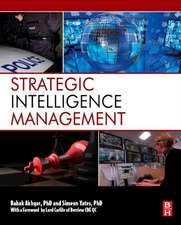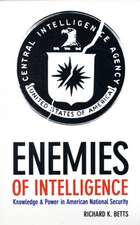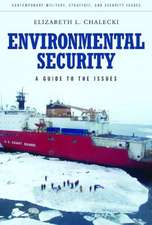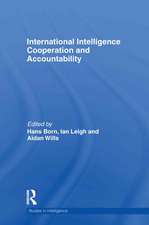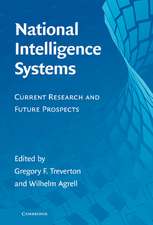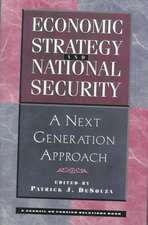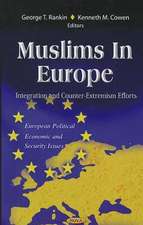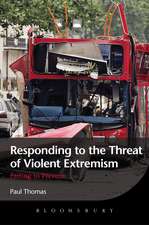Intelligence and Intelligence Analysis
Autor Patrick Walshen Limba Engleză Paperback – iun 2011
- applying intelligence
- understanding structures
- developing a discipline.
Uniquely bringing together significant theoretical and practical developments in a sample of traditional and emerging areas of intelligence, this book provides readers with a more holistic and inter-disciplinary perspective on the evolving intelligence field across several different practice contexts.
Intelligence and Intelligence Analysis will be relevant to a broad audience including intelligence practitioners and managers working across all fields of intelligence (national security, policing, private industry and emerging areas) as well as students taking courses in policing and intelligence analysis.
| Toate formatele și edițiile | Preț | Express |
|---|---|---|
| Paperback (1) | 373.79 lei 3-5 săpt. | +30.23 lei 7-13 zile |
| Taylor & Francis – iun 2011 | 373.79 lei 3-5 săpt. | +30.23 lei 7-13 zile |
| Hardback (1) | 1339.41 lei 6-8 săpt. | |
| Taylor & Francis – iun 2011 | 1339.41 lei 6-8 săpt. |
Preț: 373.79 lei
Nou
Puncte Express: 561
Preț estimativ în valută:
71.52€ • 74.68$ • 59.20£
71.52€ • 74.68$ • 59.20£
Carte disponibilă
Livrare economică 14-28 martie
Livrare express 28 februarie-06 martie pentru 40.22 lei
Preluare comenzi: 021 569.72.76
Specificații
ISBN-13: 9781843927396
ISBN-10: 184392739X
Pagini: 352
Ilustrații: 4 b/w images, 2 tables and 4 line drawings
Dimensiuni: 156 x 234 x 20 mm
Greutate: 0.65 kg
Ediția:1
Editura: Taylor & Francis
Colecția Willan
Locul publicării:Oxford, United Kingdom
ISBN-10: 184392739X
Pagini: 352
Ilustrații: 4 b/w images, 2 tables and 4 line drawings
Dimensiuni: 156 x 234 x 20 mm
Greutate: 0.65 kg
Ediția:1
Editura: Taylor & Francis
Colecția Willan
Locul publicării:Oxford, United Kingdom
Cuprins
Foreword. Preface Part 1: Applying Intelligence 1. Introduction 2. Traditional Intelligence Practice 3. Emerging Intelligence Practice Areas 4. Intelligence and Capacity Building Part 2: Understanding Structures 5. Intelligence Models and Frameworks 6. Building Better Intelligence Frameworks 7. Intelligence Leadership and Management Part 3: Developing a Discipline 8. Ethics and Legislation 9. Analytical Innovations 10. Intelligence Education and Professionalism 11. Research and Theory Building 12. Conclusion. References. Index
Recenzii
'It has been almost a decade since the 9/11 attacks – but we still struggle to conceptualize intelligence in a broader context beyond the traditional foreign policy arena and to find ways to move easily between foreign and domestic intelligence issues. Patrick Walsh, in Intelligence and Intelligence Analysis, offers that broader context, not only by examining a range of both foreign and domestic intelligence issues, but by focusing across the "Five Eyes" intelligence enterprises: the U.S., Britain, Australia, Canada and New Zealand. This is a unique and long-needed approach; Walsh has made a real contribution to the intelligence canon.' – Mark M. Lowenthal, President and CEO, The Intelligence and Security Academy
'This is a thought-provoking and comparative analysis. Discussing intelligence structures and processes both in the national security domain and beyond, it develops a research strategy for more effective and resourced intelligence that will be of much interest to practitioners and researchers alike.' – Professor Peter Gill, Liverpool University
'This is a thought-provoking and comparative analysis. Discussing intelligence structures and processes both in the national security domain and beyond, it develops a research strategy for more effective and resourced intelligence that will be of much interest to practitioners and researchers alike.' – Professor Peter Gill, Liverpool University
Notă biografică
Patrick F. Walsh is a senior lecturer (criminal intelligence) at the Australian Graduate School of Policing, Charles Sturt University, Australia; Vice President (admin) of the Australian Institute of Professional Intelligence Officers (AIPIO); and managing editor of the AIPIO Journal.
Descriere
This book tracks post 9/11 developments in national security and policing intelligence and their relevance to new emerging areas of intelligence practice such as: corrections, biosecurity, private industry and regulatory environments.

